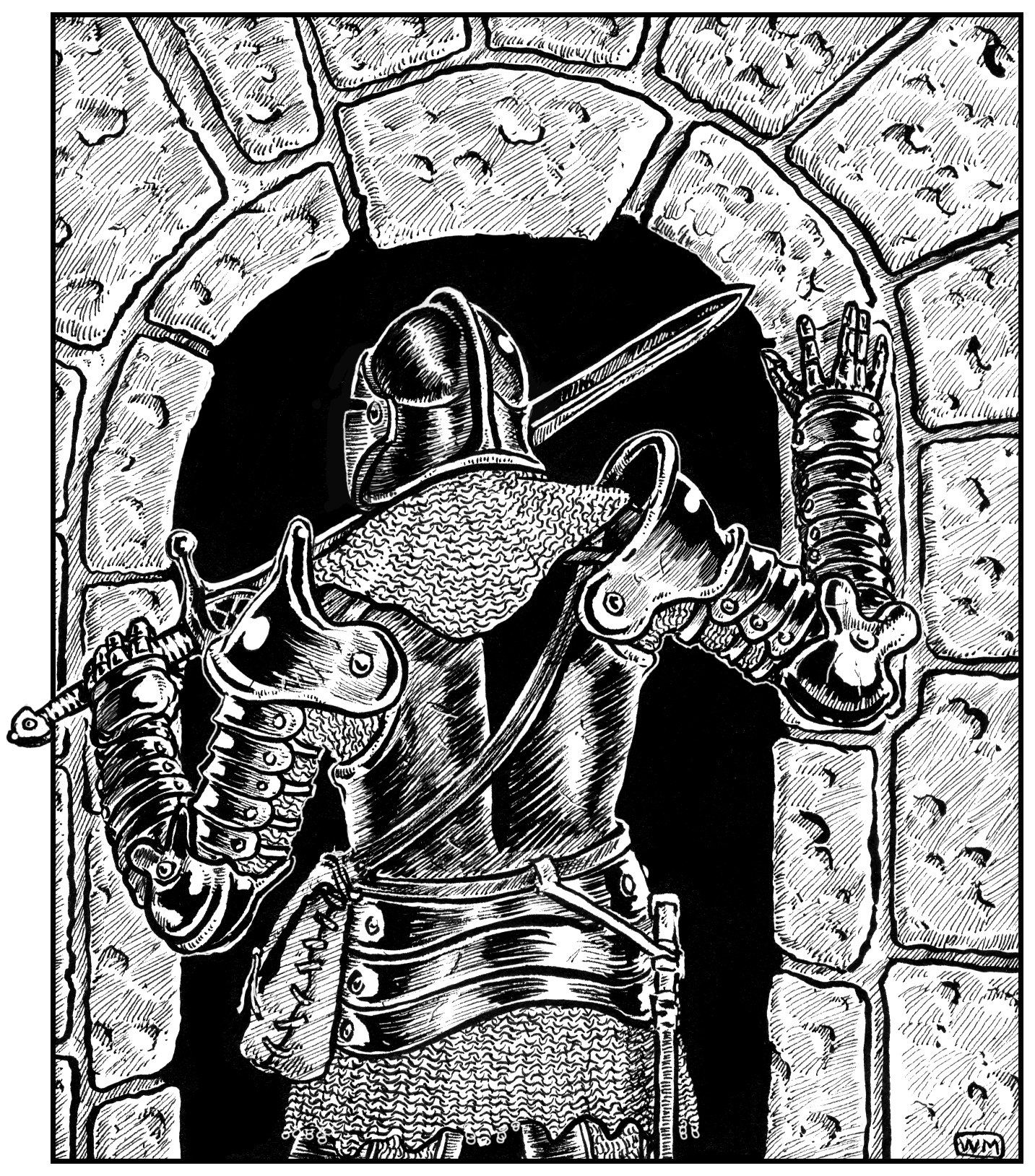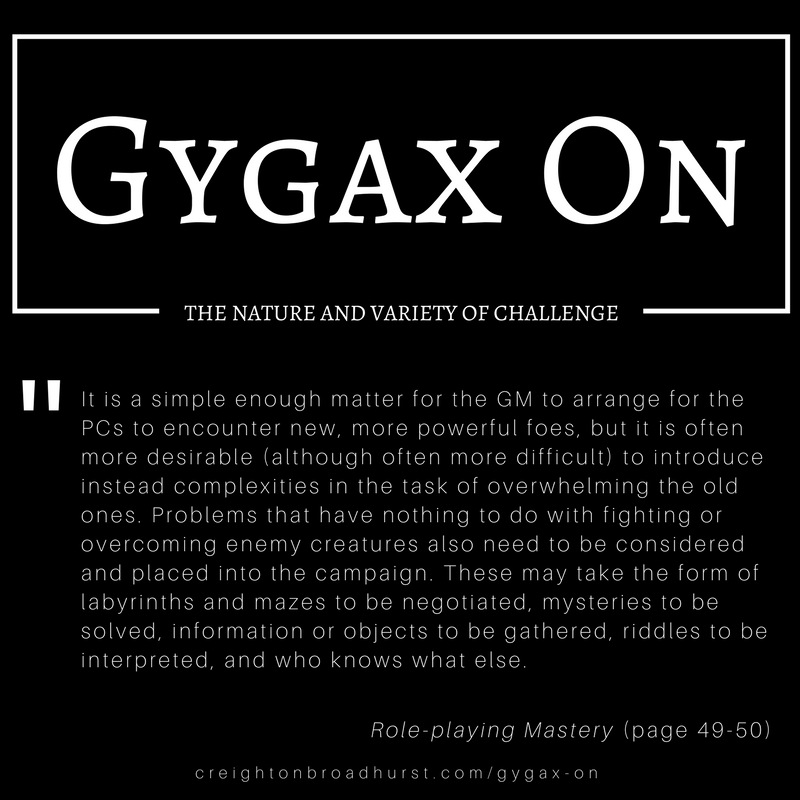It’s not the world’s snappiest title, but challenge is at the heart of every gaming session. The PCs may have to crush the forces of the evil goblin king, root out a pernicious black cult or simply find their way out of a labyrinthine network of caverns.

Whatever their mission, it involves opponents and challenge. Of course, a campaign repeatedly pitting the PCs against a variety of goblins and their sinister master is probably going to get boring. It is common sense that it behoves a GM to vary the challenges with which he assails his PCs (without crushing the players’ suspension of disbelief).
So what did Gary say?
“It is a simple enough matter for the GM to arrange for the PCs to encounter new, more powerful foes, but it is often more desirable (although often more difficult) to introduce instead complexities in the task of overwhelming the old ones. Problems that have nothing to do with fighting or overcoming enemy creatures also need to be considered and placed into the campaign. These may take the form of labyrinths and mazes to be negotiated, mysteries to be solved, information or objects to be gathered, riddles to be interpreted, and who knows what else.”
Role-Playing Mastery, Gary Gygax (page 49-50)
As we do so often, we see Gary’s desire to inject a (reasonable) level of realism into his games, in an attempt to present his players with a variety of challenges not always linked to combat. As I’ve noticed in reading many of Gary’s adventures, he liked to provide varied challenges to foster creativity in his players. Frankly, I’m a big fan of that.
Additionally, to my mind, the greater the level of challenge (within reason) the greater the sense of achievement. I’m not purely speaking of CRs and ELs, here. To give an example, in Borderland of Adventure campaign one of the players had been looking for a lost dwarven citadel hidden somewhere in the nearby mountains. I’ve dropped many clues and hints over the last ten gaming sessions. In the last session before Christmas, he finally worked out where it was and was quite chuffed (that’s English for proud).
I suspect his sense of achievement would have been somewhat less if I’d simply given him a map. (Of course, the challenge is not yet over as other adventures presented themselves, meaning he didn’t get to the lost hold for quite some time…)
So don’t be afraid to challenge your players with non-combat problems that need resolving. How do they uncover the location of the evil villain’s lair? How do they scale the dangerously slick Cliffs of Doom or escape the clutches of the sinister tax collector? All add to the depth of the campaign and add to the PCs’ sense of achievement when they finally defeat their nemesis. And are far more diverse than simply fighting an orc with a few levels of fighter.
Was Gary Right?
Was Gary right? Was he wrong? Is the challenge of (say) getting bulky treasure out of the dungeon safely or dodging the sinister Collector of Taxes less fun than whacking more orcs? Let me know in the comments below.

I prefer a variety of challenges, but there the most important rule for dealing with these is that the GM must NOT have a single solution in mind. Players have several minds, the GM just one. So if the players figure out that declaring their looted treasure is actually recovered church wealth, knowing that the church doesn’t get taxed, it is patently unfair for the GM to say “No.”
Instead, the GM should look at the new challenges the players’ have allowed. Perhaps the real church hears about it and gets in on the action, or a church sends a representative to this new church to ensure it is actually an orthodox church and not one of those newfangled “we let anyone worship, even orcs!” setups. So the adventure becomes a dash to run interference and round up “worshippers” at the last minute. Old American readers might remember an old episode of I Love Lucy where Lucy starts a charity (“Ladies Overseas Aid”) thinking they can get a bunch of money, only to discover that gambling is illegal . . . and managing to lose all the money because there really is a Ladies Overseas Aid charity.
That said, it takes work to create a dynamic world where problems exist other than those that can be solved via violence. The reward for this work is an immersive world that players want engage.
I think Gygax was right in the sense that there should be noncombat challenges in the game. After all, fighting gets old and you eventually master all your combat tricks. So throwing in traps and puzzles and roleplaying-oriented challenges is a plus. I’m not sure about your examples in the final paragraph. I’ve often felt that Gygax’s obsession with the minutiae of transporting treasure bordered on turning the game into Lairs & Logistics rather than Dungeons & Dragons.
I completely agree, I love challenges that mean players have to think. I love the ending to the film National Treasure, yeh its an Indy rip off but think about it. Look at the treasure. How the hell would you get that out if it wasn’t modern day!!
Last time in town, the party sparked off an economic boom, the mayor got involved, gave them sashes, proclaimed them heroes and of course heroes pay their taxes, just so he could get the walls repaired. Cue party burying treasue o/s town, alignment talk when the lawful good priest says thats wrong etc
i completely believe he was right. Fighting of course is always a challenge. Tho in real life we are challenged by regular activities every day. Simply adding 10 lbs. of coin weight to a persons load makes walking with the already 92 lbs of gear that much more heavy. not so much encumbrance but stamina wise. or things like walking for 4+ hours on end, riding a horse for long periods causes challenges in a sensitive manner. both would seriously put a melee class at a disadvantage for combat.. note: no riding land based proficiency. that can cause chafing, adjust combat modifiers for such players… digging is exhausting, mapping is time consuming, checking for traps is mundane but thieves love it! many classes descriptions give great ways to challenge the players of that class, outside of combat. wizards want to learn new spells, or find componets… priests dont always have to explore dungeons to find wisdom… fighters can try to learn to cook??… and thieves.. well, if there was a class built out of exploiting the mundane in life for gold and infamy, thats a thief. so from trying to hide in the bushes from the local constable, making potions, gambling, street racing, accepting weird challenges all the way to rolling non-weapon proficiency specific rolls. you can challenge the players in every which way…
Non-combat challenges are a lot of fun, and worth the reward. That said it does bring to mind a line I read at some point:
Killing the Boss Monster: 5 minutes
Crossing a 10-foot gap: 2 hours
Too true. Too true.
😉
Oh darn! I missed an opportunity and gave my players a map! LOL Well, I’m an inexperienced DM and they aren’t hugely experienced players, we’ll do this together and learn!
What a great little article, Creighton!
It delivers a very specific look at what a lot of GMs/DMs forget.
The intent a.) to have fun, and b.) to feel like you accomplished something through challenge. It’s the same reason modern computer games offer badges and such for “achievements”. Even my watch gives me little shields for accomplishing movement goals and such which aren’t easy to get … one has to *try* to get them and meet the challenges.
Good advice for storytellers of any game system in any setting!